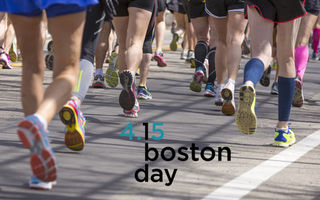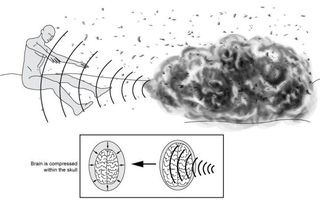Traumatic Brain Injury
Blast Injury: Coping With the Unexpected!
Life presents unexpected challenges, but we can always recover our wholeness.
Posted May 2, 2016

No one attending the Boston Marathon on Patriot’s Day in 2013 expected to be victims of a terrorist attack that killed three spectators, and physically injured more than 260 people. Many more are still suffering from living through that experience, which is called Post-Traumatic Stress Disorder (PSTD). Over 20,000 people within one-quarter mile of the blast experienced the effects of a blast injury, resulting in Post-Concussion Syndrome (PCS). Beginning this year, Boston will celebrate annually the strength and resiliency of the city with One Boston Day.
Blast Injury Explained

If you are in the military, you are aware of bomb explosions or improvised explosive devices (IEDs) that produce a sound wave called a supersonic wave. The movement, amplitude, and duration of the sound wave result in sufficient pressure within the brain to cause actual tissue damage along with dysregulation of connectivity and brain waves. An individual does not have to be physically moving or in contact with the blast for this injury to be enormous.
Of the 20,000 people close to the Boston Marathon bombing, over 90% will be misdiagnosed as having PTSD, because many of the symptoms of PCS are similar to those of PTSD.
Resiliency
In our everyday life there are various hills, valleys and unexpected events, like a road detour when you’re late for work. Life’s unexpected hiccups are annoying, but not life changing. I’m talking about taking the kids to the city for a fun holiday event, and experiencing the chaos of an unexpected, life-changing event. I mean the major events that occur and do change our lives, such as a heart attack, stroke, concussion, cancer, hurricane, major accident, sudden death of a loved one, or a terrorist attack resulting in a blast injury. The key, I think, is resiliency. Resilience is the ability to recover from adverse change.
I, myself, am a person with a brain injury.
As many of you know from my "About Dr. Diane" page (Dr. Diane's Story), my life changed in 1990 in a matter of minutes when I had a cerebral bleed that caused me to pass out while driving, resulting in a head-on auto accident. Five months later I had brain surgery, and four years later I was told I was permanently brain damaged and I would never walk, talk or think the same way again. They said I had no hope of recovery.
Cancer

My most recent unexpected event is that I have been diagnosed with Cancer (Lymphoma). I had had no symptoms of the brain tumor or the tumor in my liver in the last year, which led me to believe that everything was fine. I even felt well enough to mark off one of my items on my bucket list...a trip to India. Last November, I had a repeat MRI of my liver, only to discover that my liver specialist felt I truly needed a biopsy of the tumor, which had grown. Once again I was coping with the unexpected. The results of the biopsy changed my life forever when I was diagnosed with lymphoma.
Coping with the unexpected is what I do. I do it professionally and I do it for myself. I have a team of brain health experts who have helped me cope over the years with brain injury, Lyme disease, multiple concussions, a brain tumor, and most recently, cancer (Lymphoma).
Because of my prior brain injuries I have chosen NOT to do chemo. Instead, I'm doing neurofeedback (pEMF) protocol for cancer, hypnosis (I'm published in the field of hypnosis for cancer), cancer diet, Essiac tea, Blue Green Algae, whole food supplements, aroma therapy, and Reiki. I have been following my cancer diet that has been further customized by my team member, Nutrition Educator Martha Lindsay.
I have done this for two months, and I am happy to report that my PET scan this week showed that my tumor has decreased, and there is no metastasis. Success! My method of treatment is working for me.
Blast Injury Help
Again, I am reminded of Resiliency. The city of Boston has designated the anniversary of that awful day in 2013 to One Boston Day, celebrating the strength and resiliency of the city. How we cope with the unexpected is what counts, be it the aftermath of a blast injury, diagnosis of cancer, stroke, or a long list of unexpected events. It is inspiring to see the resiliency of Marathon blast victims proudly walking and running with their prosthetics. With the methods in my recent book, I co-authored with Barbara Albers Hill, Coping with Concussion and Mild Traumatic Brain Injury, the 20,000 individuals affected by the blast injury can be helped. With the information in this book and what I’ve learned, once again I will be able to apply this to my own unexpected life event. You can regain your life. There is a Way!
Dr. Diane Roberts Stoler, Ed.D.
Copyright ©) April 14, 2016


